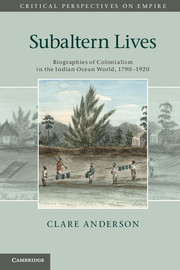Description
Subaltern Lives
Biographies of Colonialism in the Indian Ocean World, 1790–1920
Critical Perspectives on Empire Series
Author: Anderson Clare
This fascinating book uses biographical fragments to shed new light on colonial life and convictism in the nineteenth-century Indian Ocean.
Language: English
Subject for Subaltern Lives:
Approximative price 32.87 €
In Print (Delivery period: 14 days).
Add to cart
Subaltern Lives
Publication date: 04-2012
Support: Print on demand
Publication date: 04-2012
Support: Print on demand
Approximative price 62.51 €
In Print (Delivery period: 14 days).
Add to cart
Subaltern lives: convicts, and colonialism in the indian ocean world
Publication date: 04-2012
238 p. · 15.5x23.4 cm · Hardback
Publication date: 04-2012
238 p. · 15.5x23.4 cm · Hardback
Description
/li>Contents
/li>Biography
/li>
Subaltern Lives uses biographical fragments of the lives of convicts, captives, sailors, slaves, indentured labourers and indigenous peoples to build a fascinating new picture of colonial life in the nineteenth-century Indian Ocean. Moving between India, Africa, Mauritius, Burma, Singapore, Ceylon, the Andaman Islands and the Australian colonies, Clare Anderson offers fresh readings of the nature and significance of 'networked' Empire. She reveals the importance of penal transportation for colonial expansion and sheds new light on convict experiences of penal settlements and colonies, as well as the relationship between convictism, punishment and colonial labour regimes. The book also explores the nature of colonial society during this period and embeds subaltern biographies into key events like the abolition of slavery, the Anglo-Sikh Wars and the Indian Revolt of 1857. This is an important new perspective on British colonialism which also opens up new possibilities for the writing of history itself.
1. Subaltern lives: an introduction; 2. Dullah; 3. George Morgan; 4. Narain Singh; 5. Liaquat Ali and Amelia Bennett; 6. Edwin Forbes; 7. Conclusion; Bibliography.
Clare Anderson is Professor of History at the University of Leicester. She is currently developing comparative work on European penal colonies, on the interface between 'academic' and 'family' history, and the relationship between history, sociology and anthropology.
© 2024 LAVOISIER S.A.S.




